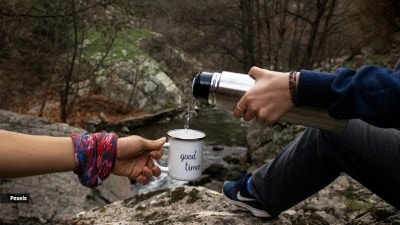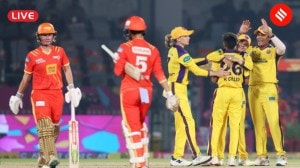Partying in Lahore
The lobby of the Pearl Continental Hotel gleams with glass and flowers. Elevators swish up and down. Ravishing beauties in chiffon salwar ka...

The lobby of the Pearl Continental Hotel gleams with glass and flowers. Elevators swish up and down. Ravishing beauties in chiffon salwar kameezes and macho medallion men in white shirts stroll by. A thirsty Indian rushes frantically down into the lobby. 8220;I say, my dear girl, can you help me get a drink?8221;
To find a chota peg in Lahore you must have contacts among infidels. My senior Indian friend is a nawabi bon vivant from Lucknow and like all aristocratic tipplers, he needs his evening beverage. But since he is also a Muslim, he cannot buy himself a drink in Musharraf8217;s land because booze is sternly prohibited for the Islamic brotherhood, even if they are foreigners.
A few hours ago in his room my friend had ordered himself a glass or two. 8220;What8217;s your religion?8221; the waiter asked. 8220;Christian,8221; said the senior nawab blithely, certain that Allah would be merciful to the seriously needy. 8220;Passport please,8221; the waiter barked. 8220;Er8230;8221; the senior nawab gulped, 8220;you want to see my passport?8221; 8220;Yes,8221; said the stone-faced waiter. Since his passport, bearing his full Prophetic name, would instantly reveal his lie, he could only look on gloomily as the drinks were removed and the waiter shut the door with a disapproving snap.
In the depths of despair, my nawabi friend came hurrying down to the lobby to seek out kafir buddies who might buy him some unholy spirit. In deepest sympathy I ask my senior friend to join me at the party to which I8217;m invited to that evening. An old Oxford friend runs one of Lahore8217;s most successful businesses, his family are old PPP Establishment and his home and hospitality is always a treat. In Gulberg 5 the Malabar Hill of Lahore, the drawing rooms are subdued and 1970s. Cut glass on the tables and giant watercolours on the walls, complete with brocade curtains, wall-to-wall carpeting and bulbous lilac cushions.
There is a young civil servant, an executive with Pepsi, a lawyer, and a businessman who has just set up a call centre in Lahore and is reading the biography of Chandrababu Naidu. Their wives are arranged separately in a demure semi-circle, wearing chiffon salwar kurtas with ankle length pyjamas, discreet emeralds and garnets, plastic stilettoes with perfectly manicured hands and feet.
Their blonde children8212;my friend8217;s wife is Kashmiri and could easily pass for north European8212;scurry around. The music of Fakhre Alam, Pakistan8217;s new pop sensation, drifts from the CD player and while the men talk of Pakistani politics, the women giggle about weddings and how Abida Parveen herself came to sing at a recent 8220;maiyo8221; maiyo is a 8216;ladies only8217; ceremony during Pakistani marriages. 8220;We all had arranged marriages!8221; they giggle.
I try and organise a drink for my senior Indian friend. 8220;Sorry,8221; shrugs my Pakistani friend, 8220;this is a dry house.8221; To compensate, he offers us a range of Cuban cigars, but my senior Indian friend8217;s mental state is deteriorating fast and he is left with no option but to dial the number of a cousin he hasn8217;t seen in several decades. 8220;Hello? Remember me? Yes, I8217;m in Pakistan. Tell me, do you serve alcohol in your house? You do? Well, then can I come and see you? Wonderful! Oh, and by the way, are you quite well?8221;
Nimbu paani, sweet and salty, is passed around and excitement about India explodes. 8220;But are Indian women really like the ladies in Saas Bhi Kabhi Bahu Thi?8221; whispers a lady in a black sequinned Mughal-e-Azam outfit. 8220;Every time I see those serials, I think, no, no, they are not like this. Indian women are not like this. I don8217;t see any women in so much sindoor around Delhi. It8217;s only the new fashion to make everything look Hindu.8221;
There is a hot defence of Sachin Tendulkar. Of course, he should have his Ferrari! The Indian government shouldn8217;t be like the Pakistani one which denied Waseem Akram his Jaguar. Every little detail of Indian life is discussed threadbare. How Aamir Sohail smashed Venkatesh Prasad. Tendulkar8217;s centuries. Salman Khan and Aishwarya Rai. Adnan Sami and Zeba Bakhtiyar: didn8217;t I know they were once married and even have a son! The lawyer, nephew of an important politician, tells a joke: There was once a Pakistani dog and an Indian dog. The Pakistani dog was fat and strong and the Indian dog was thin and scrawny. One day the Pakistani dog asked the Indian dog if he could cross the border and come to his country. 8220;But why?8221; asked the Indian dog, 8220;you are so fat and well cared for.8221; 8220;Haan khana to bahut milta hai,8221; said the Pakistani dog, 8220;par yahan bhaukne nahin dete!8221; they don8217;t let you bark. Much laughter. A woman in a maroon outfit turns to me: 8220;You must see our new shop here called 8216;Khadi8217;. Very nice! No kacha kacha dhaga like in Indian clothes.8221; Dinner is served. My senior nawabi friend who, after his eighth nimbu pani, fled with his distant cousin towards whisky, has missed some utterly delicious food. There is chappal kebab flattened beef fried with onions and served with a sweet plum sauce, haleem, biryani, chicken, sweet rotis and a pasta salad. Then there is cherry pudding, chocolate mousse, fruit salad and cream and seviyan, finished off with green tea and paan. After dinner there are plans to go shopping. Shopping, at this hour? 8220;No problem,8221; says my friend,8221; we8217;ll open the shops for you.8221; After the meal, movement is impossible and I opt instead to return to my hotel. As we drive back in a white Mercedes, my friend points out how Shahbaz Sharif former chief minister of Punjab actually broke down some parts of a mosque to widen a road. 8220;Incredible!8221; my friend says admiringly, 8220;only he could have done it. His mentor was Chandrababu Naidu.8221; In the hotel lobby, the beauties have gone. Only a lonely pianist plays, 8220;Suhaani raat dhal chuki..8221; In my room, a message from my senior friend. 8220;Thanks for helping me resurrect my evening.8221;
- 01
- 02
- 03
- 04
- 05































